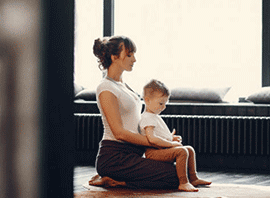Fussy babies are babies who cry and fuss frequently and are difficult to soothe. There can be many reasons why a baby may be fussy, including hunger, discomfort, overstimulation, tiredness, illness, or simply a need for attention or comfort.
If you are dealing with a fussy baby, it's important to try to identify the underlying cause of their fussiness.
THE CAUSE
- Gas and Colic: Gas and colic can cause discomfort and pain in babies, leading to fussiness and crying. Some babies may experience colic, which is a condition that causes excessive crying and fussiness in otherwise healthy babies.
- Overstimulation: Babies can become overstimulated if they are exposed to too much noise, light, or activity. Overstimulation can make it difficult for babies to relax and fall asleep, leading to fussiness.
- Tiredness: Babies need a lot of sleep, and when they become overtired, they may become fussy and difficult to soothe. It's important to establish a regular sleep schedule for babies and ensure that they are getting enough sleep during the day and night.
- Illness: Babies may become fussy if they are not feeling well. Common illnesses in babies include ear infections, colds, and allergies. If your baby is experiencing symptoms such as fever, vomiting, or diarrhea, it's important to seek medical attention.
- Growth Spurts: Babies go through periods of rapid growth, during which they may become fussy and irritable. These growth spurts are normal and usually last for a few days to a week.
- Teething: When babies are teething, they may experience discomfort and pain in their gums, which can lead to fussiness and crying. Teething can also cause babies to drool more, which can irritate their skin and lead to a rash.
- Allergies or Sensitivities: Some babies may be sensitive or allergic to certain foods, such as cow's milk, soy, or nuts, which can cause fussiness, digestive problems, or skin rashes. It's important to talk to your pediatrician if you suspect that your baby has a food allergy or sensitivity.
- Separation Anxiety: Babies may experience separation anxiety when they are away from their primary caregivers, which can cause them to become fussy and cry. This is a normal part of development, and it usually resolves as babies become more comfortable with different caregivers and environments.
- Need for Stimulation: While overstimulation can make babies fussy, some babies may also become fussy if they are not getting enough stimulation or attention. It's important to engage with your baby through play, conversation, and eye contact to help them feel stimulated and connected.
- Temperament: Finally, some babies are simply more fussy or irritable than others. Each baby has their own unique temperament, and some babies may be more sensitive to changes in their environment or routine. In these cases, it's important to be patient and understanding, and to provide extra comfort and reassurance to help soothe your baby.
Remember, all babies will be fussy at times, and it's important to be patient and responsive to your baby's needs. If you are concerned about your baby's fussiness or if you are having trouble soothing them, don't hesitate to talk to your pediatrician for guidance and support.


TIPS AND TRICKS FOR FUSSY BABIES
- Check if the baby is hungry: Hunger is a common reason for fussiness in babies. Make sure your baby is getting enough to eat and is on a regular feeding schedule.
- Check if the baby is comfortable: Make sure the baby is dressed appropriately for the temperature and that their diaper is clean and dry. Check if there are any signs of discomfort such as teething, colic, or an illness.
- Create a calm environment: Make sure the baby's environment is quiet and free of distractions, which can overstimulate them.
- Try different soothing techniques: Some babies respond well to rocking, swaying, or gentle bouncing. Others may prefer being held, swaddled, or cuddled. Experiment with different techniques to find what works best for your baby.
- Be patient: Remember that fussiness is a normal part of infancy, and most babies eventually grow out of it. Be patient and try to stay calm and focused on soothing your baby.
- Use white noise: White noise, such as the sound of a fan or a white noise machine, can help soothe fussy babies by creating a calming and consistent background sound.
- Go for a walk or a drive: The gentle movement of a stroller or a car can be soothing for babies and may help them fall asleep. Plus, a change of scenery can help distract them from their fussiness.
- Try a pacifier: Pacifiers can be soothing for babies by providing a comforting sucking sensation. However, it's important to follow safe pacifier practices, such as using an age-appropriate size and never attaching a pacifier to a string or cord.
- Babywearing: Carrying your baby in a baby carrier or wrap can be soothing for both you and your baby. The closeness and movement can help soothe fussy babies and promote bonding.
- Massage: Gentle massage can help soothe fussy babies by promoting relaxation and easing discomfort. Use gentle strokes and circular motions on your baby's back, legs, and feet.
- Warm bath: A warm bath can be soothing for babies and may help them relax and fall asleep. Just be sure to supervise your baby carefully in the water and never leave them unattended.
- Try different feeding positions: If your baby is fussy during feeding, try different positions, such as holding them upright or lying them on their side. Experiment to find what works best for your baby.
- Swaddle: Swaddling can help soothe fussy babies by providing a sense of security and comfort. Use a lightweight blanket and follow safe swaddling practices, such as leaving room for your baby's hips to move.
Remember, every baby is unique, and what works for one baby may not work for another. Be patient and persistent, and try different strategies to help soothe your fussy baby. And don't hesitate to reach out to your pediatrician for additional support and guidance.












Validate your login
Sign In
Create New Account